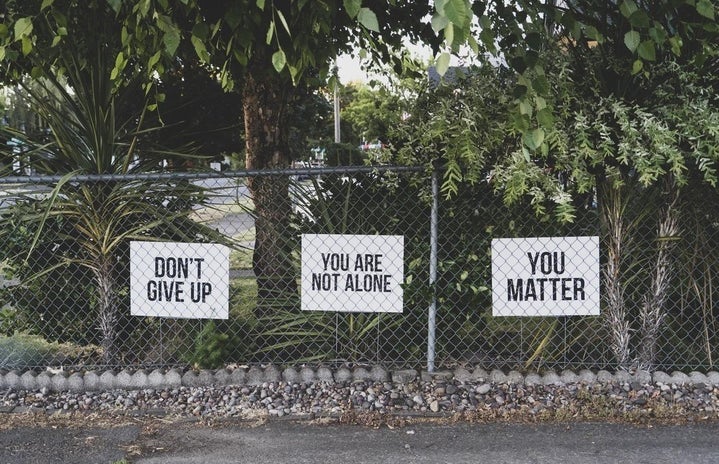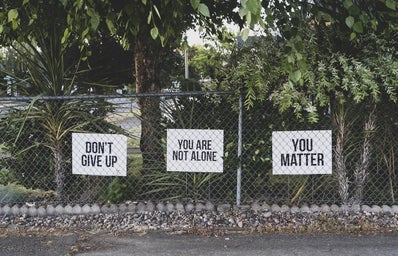*Trigger Warning: this article contains content regarding heavy subjects such as mental health struggles and suicide. Please proceed with caution.
September is National Suicide Prevention Awareness Month. Because it is often uncomfortable and stigmatized, we hardly ever have conversations about one of the leading causes of death for our age group. In the United States alone, suicide is annually the second leading cause of death for 10-34-year-olds. Globally, it is among the top 20 leading causes of death for people of all ages. Last year in 2020, approximately 2,000 college students took their own lives while 15% of all university-aged individuals reported having suicidal thoughts one or more times during our non-traditional year of school. According to the CDC, suicide claims the souls of over 45,000 individuals a year, which equates to one person taking their own life every 11 minutes.
Preventing suicide is often possible and fortunately, we can all play a key role in its prevention. During the month of September, we all have a profound opportunity to share resources, listen to testimonies, raise awareness, and personally reflect upon how we can better support one another, especially during this ongoing global pandemic. Here are some ways we can each individually contribute to the cause:
- Educate ourselves: Suicidal thoughts can affect anyone, regardless of age, race, gender, sexual orientation, and/or background. According to NAMI, only 46% of people who take their own lives have a diagnosed mental health condition. Therefore, we need to get to know the warning signs. Part of the human experience is filled with sorrow and grief; sometimes life becomes a lot to handle. Here are a few warning signs to heed in the behavior of your friends and colleagues:
- Withdrawal
- Lack of appetite
- Sleeping problems
- Increased drug and/or alcohol use
- Drastic changes in physical appearance
- Sudden gift giving of heirlooms or treasured valuables
- Re-occurring comments about hopelessness, loneliness, and unhappiness
2. Speak out: One of the best ways to help others is to open ourselves up and speak out. Having difficult conversations is never easy – especially with those we love – yet it’s important that we stop the stigma and share real facts and information. After educating ourselves, there are several ways that we can further raise awareness about this issue:
- Check in on your friends’ mental health. If someone is struggling, create an open dialogue with those close to them. Take things seriously and take action, if necessary.
- Stand up and speak out when someone around you starts to spread false information. Share the facts you have acquired with grace.
- Attend seminars or round-table discussions. While these may be challenging to attend at first due to the content, it’s important to familiarize yourself with signs and how to navigate them. These settings may also help us grow comfort in hosting hard conversations in the future.
3. Exhibit compassion to those around us: I’ve heard it said that we should “be kind always, for everyone we meet is fighting a battle we know nothing about.” Just because we don’t physically see a struggle doesn’t mean it’s not there. Some hide their battles better than others. Take people seriously if they voice negative feelings towards themselves. Listen to others with the sole purpose of listening; don’t just sit there and formulate your own response back to them. Physically be present for people. Regularly check on those close to you. Have compassion for everyone.
4. Help establish connections: Our ultimate goal should be ensuring that all individuals have access to the resources they need and the support to seek out those resources. We should normalize the act of reaching out for help without hesitation. Don’t be afraid to contact crisis numbers or hotlines to connect you or someone you know with a counselor. There are always representatives present on the other line who can help connect people with necessary treatment and support. Sometimes that initial contact is terrifying to create, so consider helping others articulate their thoughts or feelings.
If you or someone you love is experiencing suicidal thoughts or behaviors, please consider contacting the following organizations that were formed out of support and compassion:
- Call The National Suicide Prevention Lifeline at 1-800-273-TALK (8255)
- Text the Crisis Text Line by texting “HELLO” to 741741
- Contact The Trevor Project by calling 1-866-488-7386 or by texting “START” to 678-678
- In serious emergencies, call 911 immediately
Know that you are not alone. Your life is valuable. You matter here.
In loving memory of Isabelle.


